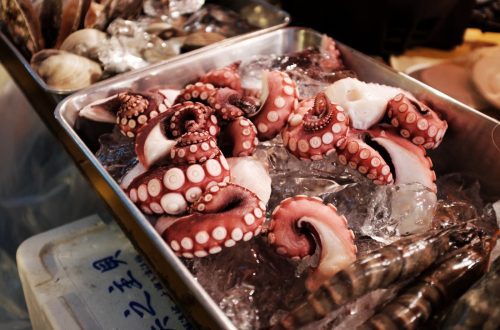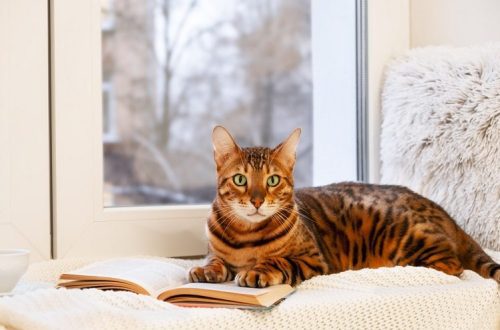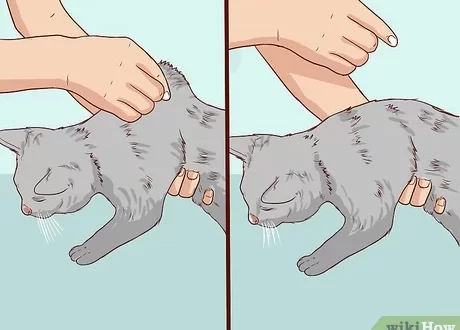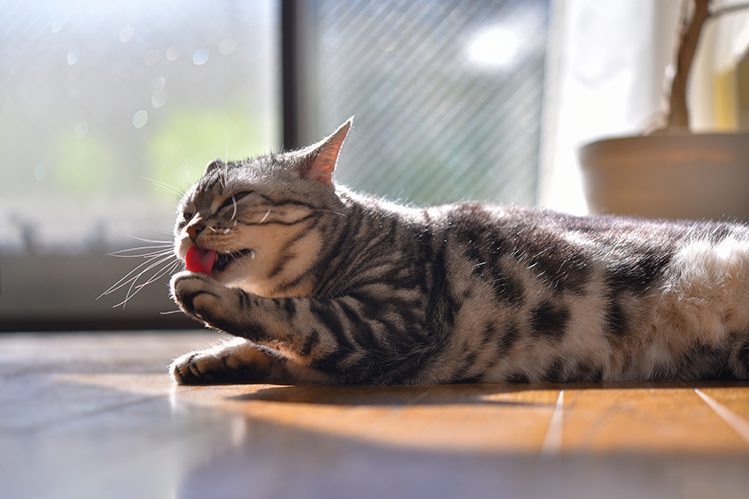
12 reasons why your cat is sick of food
Cats often have digestive problems, one of them is vomiting after eating. The owners usually attribute this to minor problems in the body, poor-quality or inappropriate food. But in reality, there are many more causes of nausea and vomiting after eating. Let’s take a closer look at why a cat is sick of food and what to do in such a situation.
The main reasons why a cat throws up food
Carefully observe the condition and behavior of your four-legged pet to understand why he is sick.
Most often, vomiting after eating occurs for the following reasons.
1. Overeating
When the owner does not follow the rules of feeding and gives the pet too much food, the cat eats more than he needs and feels unwell. In cats, the physiology of the stomach has the shape of a hollow tube and its walls cannot stretch much. Cats are not familiar with a pronounced feeling of satiety: they can shove themselves into a large amount of food and not even notice it.
If we are talking about dry food, then inside it gets wet, swells and begins to put pressure on the walls of the stomach. This causes discomfort. Therefore, for a pet, the best option to get rid of discomfort is to get rid of excess food through vomiting.
2. Fast eating
Most mustachioed eat with great appetite and too quickly, without chewing and swallowing food. Large pieces clog the stomach and can injure it. As a result, the cat feels heaviness and discomfort. To prevent cats from eating a portion too quickly, the owners buy them special bowls with protrusions inside. These protrusions do not allow swallowing large pieces. Perhaps the cat eats food quickly also because it is afraid of rivals – other pets. The presence of a relative nearby makes the purr absorb food faster: she is afraid that food will be taken away from her.
3. Food intolerance
Pets often suffer from food intolerances. Moreover, the matter may not be in the feed itself, but in some separate component of its composition. To understand what exactly your cat has a reaction to, you can only after visiting a veterinarian.
4. Abrupt feed change
When you introduce unfamiliar foods into the cat’s diet, it is stressful for her body. It is necessary to change food to another only according to indications, gradually adding new food to the old one. Every day the ratio of food increases towards the new one, until the new food completely replaces the old one.
5. Expired, low-quality and too cheap food
Be sure to check the expiration date of the food when buying and make sure that the packaging is intact, without damage. Carefully read the composition and choose the product, which includes high-quality selected meat in the first place. Such food will be more nutritious and healthier.
Do not take the cheapest feed – the quality of the ingredients in them leaves much to be desired. This will definitely affect the well-being of the pet.

6. Mixed diet
Nausea in a cat can be caused by a combination of dry and wet food from different brands that do not mix well with each other, inappropriate treats, and most importantly, mixing ready-made food and products from the human table in one diet. It is absolutely impossible to do all this.
Don’t mix foods unless you’re sure they’re compatible, and certainly don’t give your cat your favorite treats.
7. Lack of fluid
When a cat drinks little, he may feel sick after eating. The cat should always have a clean bowl of clean water freely available, which must be replaced every day. If your cat won’t drink from the bowl, try replacing the bowl or moving it to another location. Or get a special drinking fountain for your cat – it’s a win-win!
8. Inappropriate food temperature
Too cold or too hot food can also provoke an upset digestive system. Cat food should be at room temperature or slightly warmer.
9. Poisoning
If vomiting is accompanied by diarrhea, the cat is lethargic and lethargic, then you may be dealing with food poisoning. It is better to immediately contact the clinic until the pet gets worse.
10. Diseases of the gastrointestinal tract
These include gastritis, pancreatitis, inflammatory processes in the intestines. All these pathologies / diseases, after the studies and the diagnosis, should be treated in a veterinary clinic.
11. Helminths
The appearance of helminths in the intestines and can cause intoxication and affect the normal functioning of the gastrointestinal tract. At this time, the four-legged cannot eat normally, he is sick and vomits. To avoid this, it is important not to ignore routine examinations by a veterinarian 2 times a year and treat the cat for parasites at least once every 3 months.
12. Hairballs in the digestive tract
This is the #1 problem with long-haired cat breeds and other shedding pets. Cats may vomit after eating if a large amount of hair has accumulated in the stomach. To prevent the formation of lumps in the stomach, the cat should be brushed regularly.
The situation will be helped by special treats, sprouted oats and a paste for removing wool, which is sold at any pet store. In difficult cases, when hairballs (bezoars) are not excreted from the body naturally and clog the intestines, surgery may be required.
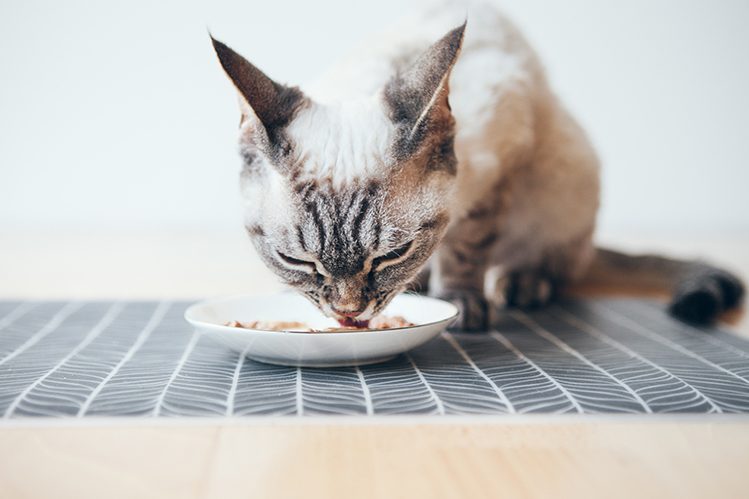
What to do if the cat is sick of food?
Disposable vomiting is unlikely to pose a serious danger, especially if after it the cat is still cheerful and playful. But it is still impossible to be indifferent to this moment, especially if vomiting occurs periodically.
Just in case, take the following steps:
Feed your pet only proven, suitable food that makes him feel good.
Give food in small portions, according to the feeding norm, do not overfeed
Make sure that the cat eats slowly in a calm atmosphere.
Make sure your cat drinks enough
Do not mix food from different brands that do not mix well with each other, do not mix ready-made food and food from the table, give the cat special healthy treats
Do not change food lines without a good reason and without consulting a veterinarian
Change feed only when necessary and gradually, over several days. To do this, add new food to the old, first in small proportions. Gradually completely replacing the old feed with new
To reduce the amount of hair entering your cat’s stomach, brush your cat regularly. Don’t forget to swim. Even if the cat does not visit the street, experts recommend washing it once every 3-4 weeks. The renewal of dermal cells is 21 days, hence the frequency
For bathing, use only professional shampoos and conditioners that are suitable for your pet’s skin and coat type. Poor-quality and inappropriate products can lead to hair loss – and the cat will swallow it when washing.
If you have taken all the measures, but the cat is still sick after eating, immediately contact a specialist to find out the reasons.



